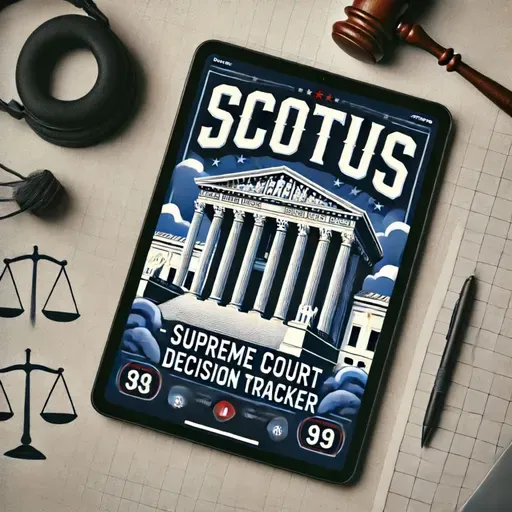
24 August 2025
Supreme Court Rulings Reshape Voting Rights and Federal Agency Oversight
Supreme Court Tracker - SCOTUS News
About
The Supreme Court has made headlines by pausing an appeals court decision that would have sharply restricted who can bring lawsuits under the 1965 Voting Rights Act. This case revolves around a challenge to North Dakota's redistricting and carries heavy implications for Native American voting rights and enforcement of anti-discrimination provisions across several states. The high court’s pause was backed by civil rights groups and Native American tribes, marking a significant temporary win for private parties, including organizations like the NAACP, who have long used the law to combat racial discrimination in voting. Three conservative justices dissented from the decision, and the case will remain in the spotlight as the two Native American tribes at the center await the next steps in their appeal.
In separate developments, the Supreme Court issued a partial stay involving National Institutes of Health (NIH) research grants, making it more challenging for public interest groups to directly contest funding decisions. Public health advocates view this move as a setback, emphasizing the Court’s stance that some federal policies or individual grant cancellations may not be subject to routine judicial review. This ongoing dispute over how NIH funding can be challenged in the courts reflects broader tensions around federal oversight and agency discretion.
The Court also recently allowed Mississippi to begin enforcing a new law restricting social media use by children, notably parental consent and age verification requirements. Although a First Amendment challenge to the law is ongoing, the justices declined to block enforcement at this time, signaling a willingness to let state regulations on children’s online activity proceed while challenges move through lower courts.
Analysis by The Regulatory Review points out that these decisions, among others, fit into a larger pattern under the current Supreme Court of expanding presidential authority, including bolstering the President’s power to remove leaders of independent agencies. Legal scholars warn that this shift could undermine the traditional checks and balances that have defined constitutional governance.
Listeners should also watch for the Supreme Court’s upcoming handling of Louisiana’s congressional map, which raises fresh issues around racial gerrymandering and the Voting Rights Act. The justices have still not resolved the case and are set to revisit arguments next term, keeping redistricting and civil rights at the top of the national legal agenda.
Thanks for tuning in and don’t forget to subscribe. This has been a quiet please production, for more check out quiet please dot ai.
For more http://www.quietplease.ai
Get the best deals https://amzn.to/3ODvOta
In separate developments, the Supreme Court issued a partial stay involving National Institutes of Health (NIH) research grants, making it more challenging for public interest groups to directly contest funding decisions. Public health advocates view this move as a setback, emphasizing the Court’s stance that some federal policies or individual grant cancellations may not be subject to routine judicial review. This ongoing dispute over how NIH funding can be challenged in the courts reflects broader tensions around federal oversight and agency discretion.
The Court also recently allowed Mississippi to begin enforcing a new law restricting social media use by children, notably parental consent and age verification requirements. Although a First Amendment challenge to the law is ongoing, the justices declined to block enforcement at this time, signaling a willingness to let state regulations on children’s online activity proceed while challenges move through lower courts.
Analysis by The Regulatory Review points out that these decisions, among others, fit into a larger pattern under the current Supreme Court of expanding presidential authority, including bolstering the President’s power to remove leaders of independent agencies. Legal scholars warn that this shift could undermine the traditional checks and balances that have defined constitutional governance.
Listeners should also watch for the Supreme Court’s upcoming handling of Louisiana’s congressional map, which raises fresh issues around racial gerrymandering and the Voting Rights Act. The justices have still not resolved the case and are set to revisit arguments next term, keeping redistricting and civil rights at the top of the national legal agenda.
Thanks for tuning in and don’t forget to subscribe. This has been a quiet please production, for more check out quiet please dot ai.
For more http://www.quietplease.ai
Get the best deals https://amzn.to/3ODvOta